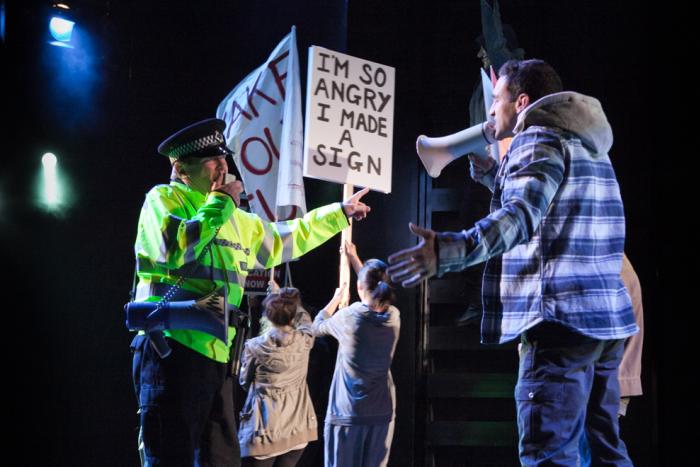The defendant, Tony, is already on the stand. His right forearm is flush against the wooden railing, torso curved from the waist, head down, shoulders stooped. His body is in the shape of a question mark. Courtroom #101, the largest in small claims court, is without spectators. Tony speaks quickly, gives his answers without hesitation. His hands rise up, open palmed, then slap against the railing. It looks like he’s in his forties, then the plaintiff’s attorney asks another question and the lines in Tony’s forehead deepen, making him look much older.
“Evidence,” the attorney, let’s call him Coltrane, repeats. “Where is your evidence?” Coltrane’s voice is booming, resonant. He lingers on the word evidence, rolling out each syllable, working the rhythm, making a crescendo with the ccccce. Coltrane’s grey hair is pulled back a tight tiny ponytail. The diamond in his left ear is large.
“I’m not going to waste the court's time with boxes and boxes of paper and emails,” Tony replies. He points to the bench behind Coltrane, where boxes of evidence are stacked. He looks at Jason, the plaintiff, who makes notes on lined paper with a silver pen. Jason does not look up. He does not speak. Jason will not say a word for the entire trial.
“It’s my word against his,” Tony says. “My word against his!”
This trial has been going on for days, even though it’s a pretty straightforward case. Jason is a stockbroker working at an investment firm at a large downtown bank. Tony, a doctor, a man whose personal worth once exceeded $800,000, was his client. Jason is suing Tony for unpaid commissions. He’s asking for $25,000, plus 15 percent as a fee for Coltrane, plus disbursements. This amount is the absolute ceiling in small claims court. If they wanted one cent more the case would be heard downtown.
“He recommended to sell Cisco, Goggle! Insane! Insane!” Tony says, slaps the railing.
“But those were your own trades.”
“He gave me his opinion.”
“But those … were … your own … trades.”
Tony doesn’t respond, stares straight ahead, freezes. For a second it’s like he’s forgotten that he’s in a courtroom, on the stand, in the middle of cross-examination. As if the thing weighing most heavily on his mind isn’t being sued for $25,000.
“My marriage is … jeopardy,” Tony says. “Because of his recommendations!”
“No further questions,” Coltrane says.
Tony comes off the stand, sits at the left end of the wooden table, and several things are revealed. He has no lawyer. He sits alone. He does not look over his shoulder to see if his wife is in the courtroom. She isn’t. His hair needs a trim. The jacket of his suit is thick black wool, expensive and tailored. But his pants are a dark navy. The two fabrics do not match. His fingers clutch the edge of the bench, as if the world has tilted and he’s trying to hold on.
Justice Setzer, whose slicked back hair and black-rimmed glasses give him an almost rockabilly look, asks for Summations. Coltrane stands, begins speaking. He holds a single piece of paper, on which are bullet points, which he expands upon. He speaks well, sums up his case with elegance and brevity, his voice alone earning his hourly. Then he sits down.
“Your summation?” Justice Setzer prompts Tony.
Tony looks up. He stands, takes some papers out of a red nylon backpack and talks for a minute, maybe two.
“Anything else you want to tell me?” Justice Setzer asks.
“No,” Tony replies.
Justice Setzer nods, closes the file in front of him. He explains that his decision will be reserved, that he will set a date to read his verdict in open court.
“Perhaps,” Coltrane’s voice booms. "If we could set a date now? Would that be possible?”
Justice Setzer nods, flips through a date book, looks up.
“I’m here on April 30th. How about April 30th? Ten o’clock? I’ll make it top of the list,” he says.
Coltrane produces his own date book, leather bound. He flips pages backwards and forwards. Jason takes out his Blackberry, presses buttons. Leaning close they consult in quiet tones. Then they both nod and Coltrane stands.
“April 30th would be fine,” Coltrane says. “10:00 a.m.”
Justice Setzer looks at the defendant. Tony has produced neither phone nor date book. On the table in front of him are his summation notes, two sheets of plain white photocopy paper. Tony flips the top one over, takes a blue pen out of his blazer. April 30th, 10, he scribbles, his handwriting sloping downwards, towards the bottom of the page.






